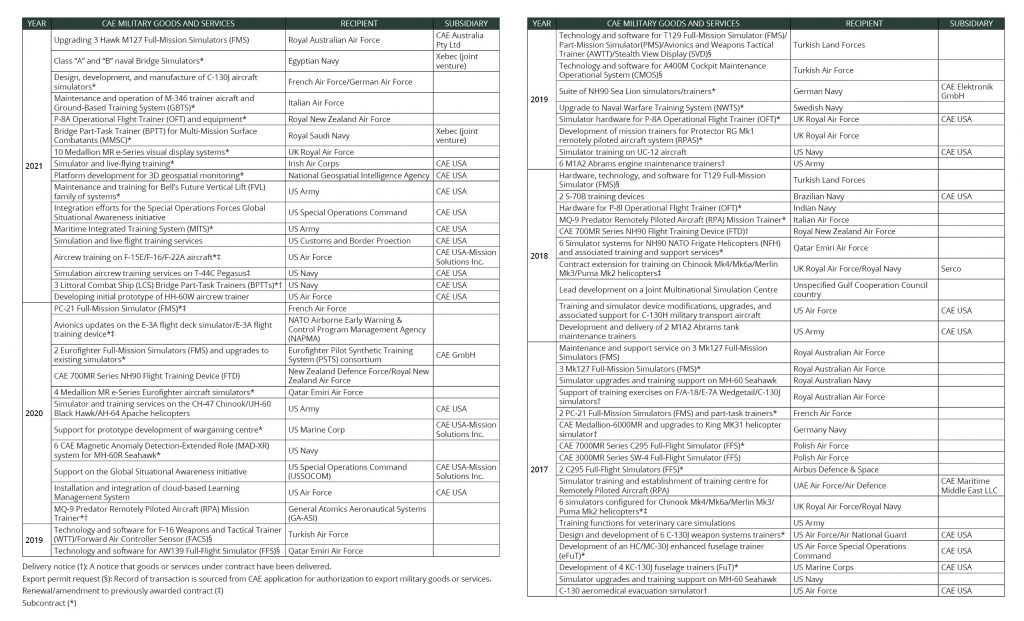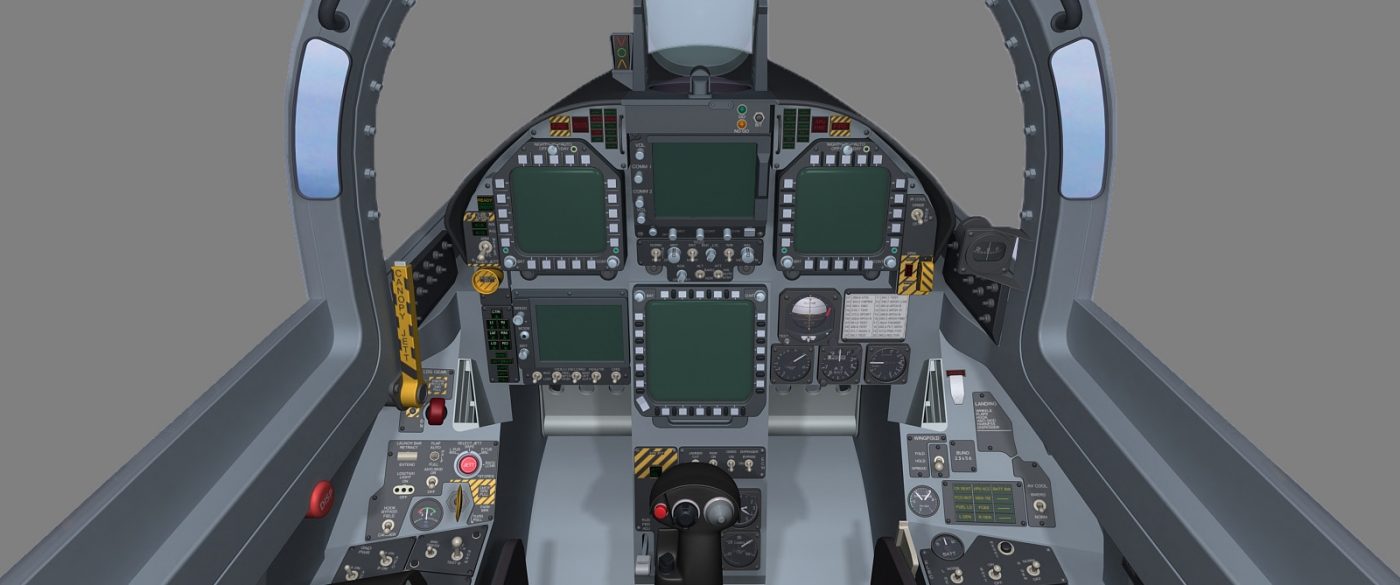How Canadian technology is shaping modern conflict
Published in The Ploughshares Monitor Volume 43 Issue 1 Spring 2022
CAE’s international sales 2017-2021
Established in 1947 as Canadian Aviation Electronics, CAE Inc. has more than 10,000 employees and operates 180 sites and training locations in more than 35 countries. While CAE produces goods for the civilian market, it is also one of Canada’s largest military manufacturers, chiefly producing cockpit simulators and associated equipment that are used in training air crew. As is true of many Canadian defence manufacturers, most of its goods and services are exported and sold on the foreign market.CAE also offers land-, maritime-, space-, and cyber-related training solutions, and has provided in-person, on-location training to military personnel of more than a quarter of all the world’s states. “Canada’s training partner of choice,” CAE has supplied the Royal Canadian Air Force since the 1950s and operates more than 30 simulators or flight training devices at 15 Canadian facilities.
A compilation of international sales
The accompanying table is a non-exhaustive dataset of CAE‘s international sales from 2017 to 2021. Data was collected from available sources, including defence journals, business publications, official contract announcements, and government releases. Information was collected only on foreign sales and so does not reflect CAE’s provision of goods and services to the Canadian Department of National Defence.

Most transactions are prime contracts or subcontracts awarded to CAE or its subsidiaries. The rest are delivery notices, contract renewals or amendments, or export permit applications. They are identified and defined in the table.
Many of these transactions deserve further attention. Here we will provide some additional information related to contracts awarded to customers in the United States and the Middle East.
BIG BUSINESS IN THE UNITED STATES
Florida-based subsidiary CAE USA handles most CAE contracts with the U.S. military. Between 2017 and 2021, CAE USA was awarded at least 20 contracts, most with the U.S. Department of Defense. With many deals going unreported, the actual number of individual transactions is likely much higher and of substantial value.
CAE currently trains American pilots on platforms that include the F-15, F-16, and F-22 fighter aircraft, the MQ-9 Predator Uncrewed Aerial Vehicle (UAV), and a number of helicopters, transportation aircraft, and maritime vessels. CAE recently acquired L3Harris Technologies’ Military Training business, which will be operated by CAE USA, and will position the company to become one of the largest providers of training to the U.S. military.
CAE IN THE MIDDLE EAST
In 2016, CAE won a contract worth a potential 450-million CAD to establish a naval training centre for the United Arab Emirates. In 2017, it won another contract to establish a training centre for the UAE Air Force and Air Defence. CAE describes itself as the prime contractor responsible for delivering all UAV-type mission training for the UAE Air Force. A subsidiary based in Abu Dhabi, CAE Middle East is a main hub for serving other customers in the region.
CAE currently trains UAE forces on the RQ-1E UAV, which is the unarmed version of the notorious American-made Predator UAV. The aircraft is used for surveillance, reconnaissance, and target acquisition. As a principal member of the Saudi-led coalition supporting the Yemeni government in the current civil war, the UAE has recently deployed the RQ-1E in Yemen.
Since 2015, the coalition has launched more than 20,000 air attacks in Yemen. According to the Yemen Data Project, January 2022 was the deadliest month for coalition air strikes in more than five years, with at least 138 civilians killed and scores more injured. As a result, leading civil society groups have called for a halt to UAV exports to coalition members.
In 2015, the coalition established a naval blockade of Yemen, which has indirectly led to the deaths and suffering of thousands of Yemenis. In 2021, a joint venture of CAE USA and Pinnacle Solutions was awarded a contract with the U.S. Department of Defense to supply trainers to both the Egyptian and Saudi navies through the Foreign Military Sales (FMS) program. Because such activities could facilitate more blockades in Yemen and elsewhere, this award raises obvious red flags.
In 2018-2019, CAE sought Canadian government approval to export to the Turkish Air and Land Forces training technology and services for T129 helicopter gunships, cockpit maintenance systems for the A400M transport aircraft, and weapons and flight trainers for the F-16 fighter aircraft. In recent years, Turkey has deployed its fleet of F-16s and other aerial assets in airstrikes against Kurdish groups and other opponents in Syria, Iraq, and southeastern Turkey. Human rights monitors such as the Kurdish Red Crescent contend that some of these airstrikes have targeted civilian sites, including markets and civilian convoys. Such actions could constitute breaches of international humanitarian law.
FINAL THOUGHTS
The demand for virtual training options for today’s militaries is expected to grow – and CAE is ahead of the curve. As its international footprint expands, it will become increasingly important to monitor CAE’s activities, if we are to understand how Canadian technology is shaping modern conflict.

